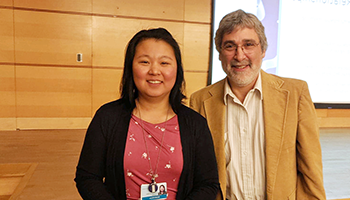HOW CAN WE HELP YOU? Call 1-800-TRY-CHOP
In This Section
Don’t Go It Alone: The Successful Mentor-Mentee Relationship
One of the most unique aspects of pursuing a career in research is the mentor-mentee relationship. As part of CHOP Research Institute’s 10th anniversary celebration of National Postdoc Appreciation Week, the Office of Academic Training and Outreach Programs hosted three successful mentor-mentee pairings from CHOP and Penn who shared their experiences in cultivating these significant personal and professional connections with candor, grace, and good humor.
Peter Davies PhD, ScD, emeritus professor of Pathology and Laboratory Medicine at the Perelman School of Medicine at the University of Pennsylvania, moderated the panel: Michael Marks, PhD, professor of Pathology and Laboratory Medicine at Penn and investigator at the CHOP Research Institute and Jing Karchin, PhD, postdoctoral fellow in the Marks Laboratory; Amita Sehgal, PhD, the John Herr Musser Professor of Neuroscience at the Penn Perelman School of Medicine and Annika Barber, PhD, postdoctoral fellow in the Sehgal Laboratory; and John Murray, PhD, assistant professor of Genetics, Penn Perelman School of Medicine, and Priya Sivaramakrishnan, PhD, postdoctoral fellow in the Murray Lab.
Throughout the interactive discussion, Dr. Davies summed up the salient points about effective mentor-mentee relationships, and we collected the takeaways to help make the most of your career journey.
Great Traits
The broader your mentoring network can be, the better.
“Differing viewpoints, to the curious mind, are invaluable,” Dr. Davies said.
When seeking other postdoc-level mentors, the ideal career mentor is five to eight years ahead of you, Dr. Barber suggested, as peers who have recently been through your current experience have wisdom to impart. Be on the lookout for mentors with these important traits:
- Empathy — life happens, in and out of the lab
- Accessibility by way of regular meetings
- Transparency to avoid misunderstandings
- Honesty and trust through interactions.
Once you find a good mentor match, establish a foundation based on mutual respect and reciprocity. Enterprising mentees who demonstrate these qualities help to foster a valuable learning climate:
- Politeness and gratitude
- Humility in the midst of achievement
- Punctuality and cognizance of others’ time
- Independent thinking to challenges current knowledge.
Set Expectations
All agreed that setting objectives and expectations for your work, as well as your mentor-mentee relationship, provides touchpoints for ongoing guidance. The National Institutes of Health strongly encourage the use of individual development plans (IDP) to guide research training, providing a framework to define goals and to facilitate communication between mentees and mentors. The IDP is a dynamic document to create short- and long-term objectives that can be refined throughout the stages of professional development.
“We tend to be hard on ourselves,” Dr. Sivaramakrishnan said. “Revisiting the development plan also helps you see that you made advances.”
Find Your Balance
It turns out postdocs are people, too. The panel emphasized that work-life balance isn’t just for people with children; perhaps you help your aging parents, care for pets, and have other volunteer commitments or obligations beyond the lab.
“Work-life balance is really a see-saw,” Dr. Barber said. “Sometimes home is winning, sometimes work is winning, and sometimes nothing is winning.”
Dr. Davies encouraged postdocs to not view perceived obstacles as insurmountable, and Dr. Karchin urged everyone to reach out for help when needed.
“Recognize what you need, and find what’s right for you to be productive,” Dr. Murray added.
The Good, Bad, and In-between
You can learn as much from bad mentoring relationships as from good ones. The panel reminded postdocs that they are in charge of the direction their career will take. Feel empowered to talk to your mentor, engage a mentoring committee for assistance, and make a change, if necessary, to further your objectives or just for the sake of feeling good about coming to work.
Be flexible and forgive yourself when setbacks — which are inevitable in research — occur.
“Everything is fluid,” Dr. Davies said. “You set a concrete hypothesis as a goal to aim for, but break into new truths.”
Commit Fully
The greatest takeaway from the panel? Postdocs should confidently own their research training and incorporate available resources to advance their knowledge.
“Use your intellectual curiosity to make the most of networking, and participate in all aspects of the postdoc experience,” Dr. Sivaramakrishnan said.
With a mix of hard work, discipline, and some luck, you will connect with a great mentor to help you along that path of discovery.
 By
By